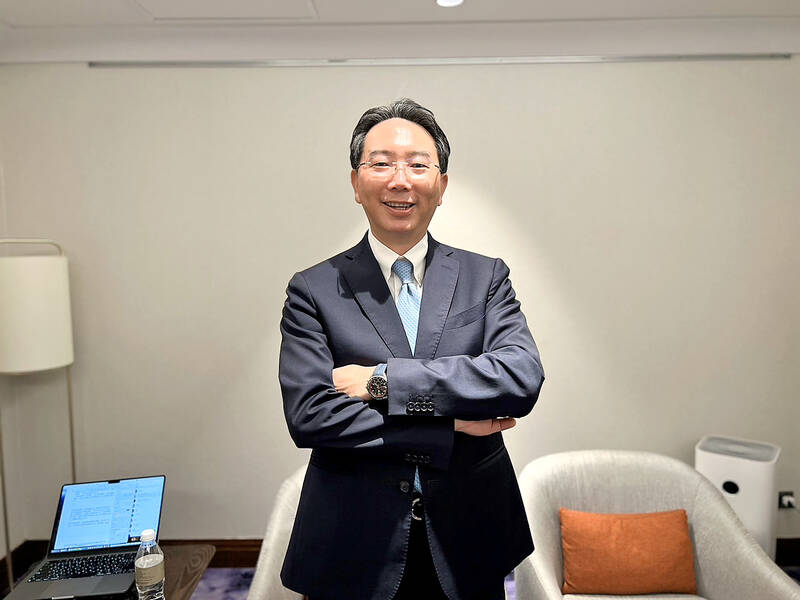Machinery maker Hiwin Technologies Co (上銀科技) forecast business would resume growth from next year after posting flat revenue growth this year, as market demand showed signs of recovery, company chairman Chuo Wen-heng (卓文恒) said yesterday.
The company saw a marked improvement in the number of visitors to the Japan International Machine Tool Fair last week and the order visibility for some Japanese machine tool makers has slightly improved compared with the previous year, Chuo told an earnings conference in Taipei.
Chuo said he had observed a relatively optimistic sentiment for the machine tool industry this year, as exhibitor attendance at the trade show seemed to be back to pre-COVID-19-pandemic levels.

Photo: Lin Jin-hua, Taipei Times
He also has a positive outlook for the US market after the US presidential election last week, as the US Federal Reserve is likely to continue its interest rate cuts, which is expected to support market demand and result in more orders for machine tool makers, he said.
Chuo said he also sees signs of improvement in the domestic market, based on the latest machine tool export data and feedback from members of trade associations.
Several machine tool makers have shifted focus to high-end product development and gradually produced components used in end applications such as semiconductor equipment, he said.
Hopefully, next year would be better than this year for Taiwan’s machine tool industry, he added.
However, the European market has slowed, with the German machine tool market particularly under pressure as the country’s automobile industry takes a hit from Chinese electric vehicles, Chuo said.
Meanwhile, the Chinese market is recovering, but visibility remains unclear, depending on the US tariff policy of US president-elect Donald Trump, he said.
In China, which contributes about 40 to 45 percent to Hiwin’s sales, order visibility is about two to 2.5 months, mainly for rush orders, he said.
While the company’s shipments to China remain steady from month to month, it is difficult to see order visibility as far out as six to eight months, he added.
Hiwin — which supplies linear guideways, ball screws, bearings and industrial robots — yesterday posted its best profit in eight quarters as its revenue continued to improve.
Net profit was NT$664 million (US$20.48 million) in the third quarter, up 14 percent quarter-on-quarter and 5 percent year-on-year, while earnings per share was NT$1.88, the highest since the third quarter of 2022, the company said.
Revenue last quarter was the highest in four quarters at NT$6.33 billion, it said.
In the first three quarters, net profit decreased 3.5 percent year-on-year to NT$1.64 billion, or earnings per share of NT$4.64, while total revenue fell 4.5 percent to NT$18.02 billion, it added.

Quanta Computer Inc (廣達) chairman Barry Lam (林百里) is expected to share his views about the artificial intelligence (AI) industry’s prospects during his speech at the company’s 37th anniversary ceremony, as AI servers have become a new growth engine for the equipment manufacturing service provider. Lam’s speech is much anticipated, as Quanta has risen as one of the world’s major AI server suppliers. The company reported a 30 percent year-on-year growth in consolidated revenue to NT$1.41 trillion (US$43.35 billion) last year, thanks to fast-growing demand for servers, especially those with AI capabilities. The company told investors in November last year that

Intel Corp has named Tasha Chuang (莊蓓瑜) to lead Intel Taiwan in a bid to reinforce relations between the company and its Taiwanese partners. The appointment of Chuang as general manager for Intel Taiwan takes effect on Thursday, the firm said in a statement yesterday. Chuang is to lead her team in Taiwan to pursue product development and sales growth in an effort to reinforce the company’s ties with its partners and clients, Intel said. Chuang was previously in charge of managing Intel’s ties with leading Taiwanese PC brand Asustek Computer Inc (華碩), which included helping Asustek strengthen its global businesses, the company

Taiwanese suppliers to Taiwan Semiconductor Manufacturing Co. (TSMC, 台積電) are expected to follow the contract chipmaker’s step to invest in the US, but their relocation may be seven to eight years away, Minister of Economic Affairs J.W. Kuo (郭智輝) said yesterday. When asked by opposition Chinese Nationalist Party (KMT) Legislator Niu Hsu-ting (牛煦庭) in the legislature about growing concerns that TSMC’s huge investments in the US will prompt its suppliers to follow suit, Kuo said based on the chipmaker’s current limited production volume, it is unlikely to lead its supply chain to go there for now. “Unless TSMC completes its planned six

TikTok abounds with viral videos accusing prestigious brands of secretly manufacturing luxury goods in China so they can be sold at cut prices. However, while these “revelations” are spurious, behind them lurks a well-oiled machine for selling counterfeit goods that is making the most of the confusion surrounding trade tariffs. Chinese content creators who portray themselves as workers or subcontractors in the luxury goods business claim that Beijing has lifted confidentiality clauses on local subcontractors as a way to respond to the huge hike in customs duties imposed on China by US President Donald Trump. They say this Chinese decision, of which Agence